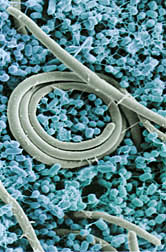Forum—Food Safety’s Bright Web Venue: FSRIO
|
|
When Salmonella enterica—the microbial menace featured in the articles "Protozoa: The Inside Story" and "Protozoa: An Animal-Research First" in this issue—causes a food-poisoning outbreak that hits the headlines, you may decide to head for the Internet to learn more.
Your online hunt for “Salmonella research” will likely lead you to FSRIO, the Food Safety Research Information Office at http://fsrio.nal.usda.gov. In fact, at Google.com, the powerful and popular search engine, FSRIO has consistently shown up at the number two spot, among the more than 1 million hits these search terms will give you.
This high search-engine ranking reflects FSRIO’s breadth and depth. FSRIO is widely regarded as the single-best source of online information about U.S.-government-funded food safety research.
With a few clicks of your computer’s mouse, FSRIO (pronounced eff-ess-ree-oh) will draw you into the food safety investigations of not only the Agricultural Research Service, but that of other U.S. Department of Agriculture agencies, as well. And FSRIO also posts summaries of projects managed by the Food and Drug Administration and the National Institutes of Health, among others.
What’s more, FSRIO offers basic information about university and privately funded investigations.
At ARS’s National Agricultural Library in Beltsville, Maryland, just outside of Washington, D.C., FSRIO staff worked with colleagues from the nearby University of Maryland-College Park and with ARS National Program staff to develop FSRIO, launching it in 2001. Today, the collaborations to manage and improve this informative and comprehensive Internet venue still continue.
If you visit FSRIO to learn more about Salmonella research, you’ll be able to skim progress reports, browse fact sheets—and more. You’ll find that FSRIO provides fine detail as well as sweeping overviews.
That’s deliberate.
Established in response to a congressional mandate, one of FSRIO’s main objectives is to pull together timely, reliable information that policymakers and research administrators can use. FSRIO provides what they need to know when they set priorities for their food safety research teams, check for research gaps, or make sure proposed research projects won’t duplicate those already under way.
The scientists carrying out the research that’s documented in FSRIO use the site, too. That’s because FSRIO gives them, and their colleagues around the globe, an easy, swift, affordable way to keep up to date and connected with the work of others in their field. FSRIO covers many bases: It presents more than 1,700 research projects for viewing—an exponential increase from the 500 projects posted at FSRIO’s inauguration 5 years ago.
As it turns out, university professors and other campus staff rank among FSRIO’s most frequent online visitors. But the site serves as a user-friendly source of reliable information for everyone, whether your interest is in food-safety discoveries, technologies, or standards, for instance.
You can easily spend minutes, hours, or even days at FSRIO’s website, perhaps choosing to skim research reports from Congress or to visit any of the 800 links vetted for you by FSRIO’s skilled staff.
Maybe you’ll want to check food safety news reports, updated every business day, or to browse the numerous other useful FSRIO resources.
This year, the site’s major overhaul will make FSRIO faster and easier for you to use.
Come take a look.
If you like what you see, we hope you’ll add FSRIO to your bookmarked favorites. And if you have suggestions, we invite you to send them to fsrio@nal.usda.gov. We aim to make FSRIO an even better resource for tomorrow.
James A. Lindsay
ARS National Program Leader
Food Safety Research
Beltsville, Maryland
"Forum" was published in the February 2006 issue of Agricultural Research magazine.







